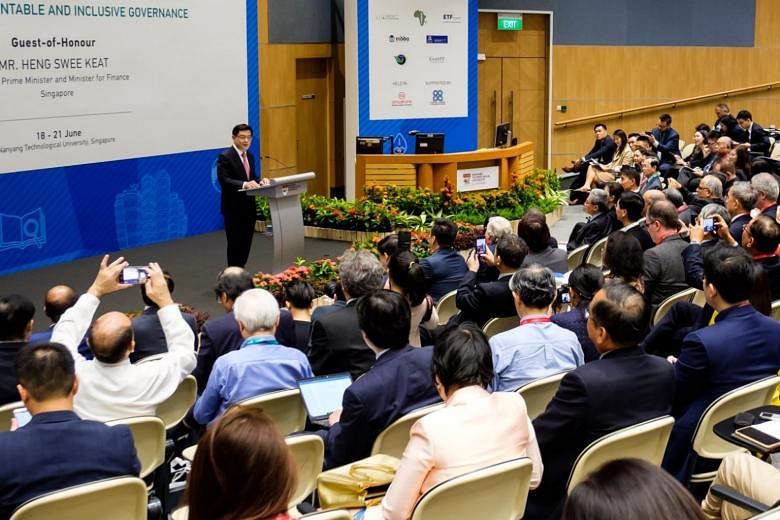SINGAPORE - One of the key principles of governance in Singapore is enabling people to fulfil their potential regardless of their backgrounds and starting points in life, said Deputy Prime Minister Heng Swee Keat on Wednesday (June 19).
This spans from investing in early childhood education, providing multiple pathways to success, and helping Singaporeans embrace lifelong learning so they can take on new jobs and keep up with technological advancements, he added.
At the same time, the Government works with the community to build a society that provides opportunities for people, Mr Heng said in a keynote address at an international conference in Singapore on governance.
One such way is by partnering social workers and voluntary welfare organisations to design and implement policies to help children with specific needs.
Empowering people to reach their fullest potential is one of three principles of governance which have worked well for Singapore, Mr Heng told more than 550 participants of the conference held at the Nanyang Technological University (NTU).
The other two principles are harnessing strength in diversity, and thinking long term and planning with future generations in mind, he said.
"Good governance has enabled a small island nation without any natural resources, that depended solely on its people, to succeed," Mr Heng said, adding that there is still much more to learn from others.
He was speaking at the opening ceremony of the four-day conference organised by NTU's Nanyang Centre for Public Administration and the International Institute of Administrative Sciences (IIAS), a Belgium-based non-profit organisation, with funding support from the Lien Foundation.
The IIAS-Lien 2019 Conference, themed "Effective, Accountable and Inclusive Governance", will discuss what constitutes good governance, under the general framework of the United Nations' 2030 Agenda for Sustainable Development.
DRAW STRENGTH FROM DIVERSITY
Mr Heng said that good governance also means drawing strength from diversity among individuals, who have different identities drawn along race, religion, gender, generation, socio-economic status and interests.
As societies develop and become diverse, people may have different expectations, concerns and needs, and if they group exclusively based on identities, diversity can become a point of division, Mr Heng said.
In some countries, intolerance and extremism are growing, breeding distrust and even violence, he pointed out.
"If we have a common call and draw strength from our differences, diversity can be an advantage," he said. "By drawing on diverse ideas and perspectives to explore issues, we experiment with possible solutions, and finding common ground, we can overcome challenges and seize opportunities together."
He noted that Singapore's approach is "to integrate, rather than assimilate our people". It has also been maintaining and growing common spaces and shared experiences, through initiatives such as the Ethnic Integration Policy that ensures a balanced mix of ethnic groups living in Housing Board estates, and national service.
Still, Singapore is pressing on with efforts to build common understanding and common spaces. One example Mr Heng cited is the "Ask Me Anything" community-led series of conversations, where religious leaders take turns to clarify common misconceptions about their beliefs and practices, and discuss sensitive issues.
"If we can empower individuals to reach their potential and harness their diverse strengths, our societies will become stronger and more united," he said.
PLAN WITH FUTURE GENERATIONS IN MIND
In his speech, Mr Heng, who is also Finance Minister, also touched on how Singapore plans with future generations in mind.
He said that public spending practices today can have implications which may last beyond the current generation.
Countries have adopted different approaches, such as raising taxes to fund current expenditures, or borrowing to fund recurrent needs and expenditures, passing the burden to future generations.
In Singapore's case, the single largest revenue for its budget is not from any form of taxes but the Net Investment Returns Contribution, Mr Heng said. And under the Constitution, the country cannot spend more than 50 per cent of the expected returns from investing its reserves.
Each generation of Singaporean leaders has upheld the discipline of running balanced budgets, setting aside surpluses, and having professional managers manage its reserves for long-term gain, he noted.
While it may seem "less painful" to spend more from reserves, compared to raising taxes, Mr Heng said that over-relying on reserves will hurt Singapore's ability to respond to changing circumstances in the future, especially given the country's lack of natural resources.
This is why the Government will raise the Goods and Services Tax from 7 to 9 per cent some time in the period from 2021 to 2025, Mr Heng noted.
"Each generation strives to pay for its own spending through sustainable means, instead of drawing more than is prudent from the reserves, or passing on the cost of current spending to future generations," he added .
Summing up, Mr Heng said that good governance is critical to the development of every country, especially in a rapidly changing and more complex world.
"Good governance is always a work in progress. We must continue to innovate and evolve, and we can do better by learning from one another," he said.
EXPERTS' TAKE ON GOOD GOVERNANCE
At Wednesday's opening ceremony, other speakers also shared their views on governance and the roles played by research and education in shaping public policy. The speakers were Professor Liu Hong, chair of NTU's School of Social Sciences, Professor Ling San, NTU Provost and Vice-President (Academic), IIAS president Professor Geert Bouckaert, and Lien Foundation chairman Laurence Lien.
Prof Ling said Singapore's progress would not have been possible if the pioneer leaders had not been bold in formulating the country's policies. "Much of this country's development has been closely connected to the evolution of our education policies and system," said Prof Ling.
Meanwhile, Mr Lien said the 4th Industrial Revolution is bringing about a new set of challenges related to the power and influence of technology that governments around the world are still trying to adapt to.
Should organisations be unable to adapt and governments fail to employ and regulate the new technologies, there will be fragmentation in society and growing inequality, he said.
"There is a greater need than ever before for public and non-profit sectors to collaborate to work together to find new solutions to address gaps and leverage the transformation around us," Mr Lien added.


